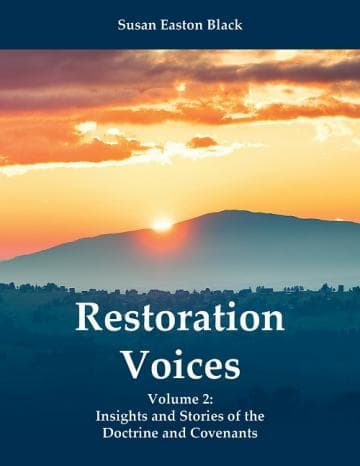Book
140 Chapters

D&C 64:9–10
On September 11, 1831, as the Prophet Joseph Smith was preparing to move his family to the John Johnson home in Hiram, Ohio, he received a revelation stating, “I say unto you, that ye ought to forgive one another; for he that forgiveth not his brother his trespasses standeth condemned before the Lord; for there remaineth in him the greater sin” (D&C 64:9). The Lord also told His Prophet, “I, the Lord, will forgive whom I will forgive, but of you it is required to forgive all men” (v. 10).
The need for forgiveness was not new. At the time of Jesus, rabbis taught, “Three offenses were to be pardoned,” but no more.[1] Jesus expanded forgiveness to an infinite number, the meaning of “seventy times seven,” for the repentant. For those who failed to repent, Jesus taught that judgment rests with God.
To forgive is to excuse from blame an offense or misdeed, whether done by self or others. In the everyday walk of life, we are all wronged at one time or another. Sometimes the wrong is innocent. Other times it is intentional. It is easy to become bitter or angry over a wrong, but the Savior counseled, “Love your enemies, bless them that curse you, do good to them that hate you, and pray for them which despitefully use you, and persecute you” (Matthew 5:44). Jesus set the perfect example of forgiveness as he hung on the cross and prayed, “Father, forgive them; for they know not what they do” (Luke 23:34).
Elder Boyd K. Packer told a story in the June 2015 Ensign that illustrates the importance of forgiveness:
If you suffer from worry, from grief or shame or jealousy or disappointment or envy, from self-recrimination or self-justification, consider this lesson taught to me many years ago by a patriarch. He was as saintly a man as I have ever known. ...
He grew up in a little community with a desire to make something of himself. He struggled to get an education.
He married his sweetheart, and presently everything was just right. He was well employed, with a bright future. They were deeply in love, and she was expecting their first child.
The night the baby was to be born, there were complications. The only doctor was somewhere in the countryside tending to the sick. ...
Finally the doctor was located. In the emergency, he acted quickly and soon had things in order. The baby was born and the crisis, it appeared, was over.
Some days later, the young mother died from the very infection that the doctor had been treating at another home that night.
John’s world was shattered. Everything was not right now; everything was all wrong. He had lost his wife. He had no way to tend both the baby and his work.
As the weeks wore on, his grief festered. “That doctor should not be allowed to practice,” he would say. “He brought that infection to my wife. If he had been careful, she would be alive today.”
He thought of little else, and in his bitterness, he became threatening. ...
One night a knock came at his door. A little girl said simply, “Daddy wants you to come over. He wants to talk to you.”
“Daddy” was the stake president. ...
This spiritual shepherd had been watching his flock and had something to say to him.
The counsel from that wise servant was simply, “John, leave it alone. Nothing you do about it will bring her back. Anything you do will make it worse. John, leave it alone.” ...
He struggled in agony to get hold of himself. And finally, he determined that whatever else the issues were, he should be obedient.
Obedience is powerful spiritual medicine. It comes close to being a cure-all.
He determined to follow the counsel of that wise spiritual leader. He would leave it alone.
Then he told me, “... It was not until I was an old man that I could finally see a poor country doctor—overworked, underpaid, run ragged from patient to patient, with little medicine, no hospital, few instruments, struggling to save lives, and succeeding for the most part.
He had come in a moment of crisis, when two lives hung in the balance, and had acted without delay.
“I was an old man,” he repeated, “before I finally understood! I would have ruined my life,” he said, “and the lives of others.”
Many times he had thanked the Lord on his knees for a wise spiritual leader who counseled simply, “John, leave it alone.”[2]
Book
140 Chapters
Items in the BMC Archive are made publicly available for non-commercial, private use. Inclusion within the BMC Archive does not imply endorsement. Items do not represent the official views of The Church of Jesus Christ of Latter-day Saints or of Book of Mormon Central.